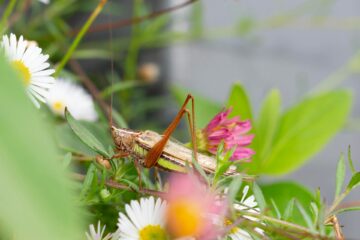Gardens are not just places of beauty and relaxation; they are also complex ecosystems teeming with life. Biodiversity, the variety of plant and animal species present in a garden, plays a crucial role in creating a healthy and sustainable environment. In this article, we will explore the significance of biodiversity in a garden ecosystem and how it contributes to the overall well-being of both plants and animals.
What is Biodiversity?
Biodiversity refers to the variety of living organisms present in a particular ecosystem. In a garden setting, biodiversity encompasses the different species of plants, animals, insects, and microorganisms that inhabit the area. The more diverse and abundant these living organisms are, the healthier and more resilient the garden ecosystem becomes.
Benefits of Biodiversity in the Garden
- Pest Control: One of the key benefits of biodiversity in a garden is natural pest control. A diverse range of plant species attracts a variety of insects, many of which act as predators to common garden pests. Ladybugs, lacewings, and predatory wasps, for example, are natural enemies of aphids and other harmful insects. By encouraging these beneficial insects to inhabit your garden, you can effectively manage pest populations without the need for chemical pesticides.
- Pollination: Biodiversity is essential for the pollination of plants in the garden. Bees, butterflies, and other pollinators rely on a diverse array of flowering plants for nectar and pollen. By planting a variety of flowering species that bloom at different times of the year, you can ensure a continuous food source for pollinators, leading to improved fruit and seed production in your garden.
- Soil Health: Biodiversity also plays a crucial role in maintaining soil health in the garden. Different plant species have varied root structures and nutrient requirements, which help prevent soil depletion and erosion. Additionally, certain plants have the ability to fix nitrogen in the soil, improving its fertility and overall health. By fostering a diverse plant community in your garden, you can create a self-sustaining ecosystem that promotes healthy soil and plant growth.
- Resilience to Climate Change: A diverse garden ecosystem is more resilient to environmental stressors such as extreme weather events and climate change. By planting a variety of species with diverse genetic traits, you can increase the garden’s ability to withstand fluctuations in temperature, precipitation, and other environmental factors. This resilience can help prevent the loss of plant and animal species due to changing climatic conditions.
How to Promote Biodiversity in Your Garden
- Plant Native species: Native plants are adapted to the local climate and soil conditions, making them well-suited to thrive in your garden ecosystem. By incorporating native species into your garden design, you can attract a diverse range of wildlife and support local biodiversity.
- Create Habitat Diversity: Provide a variety of habitats in your garden, such as meadows, wetlands, and woodland areas. Different species of plants and animals have specific habitat requirements, so offering a range of environments can attract a greater diversity of wildlife to your garden.
- Avoid Chemical Pesticides: Chemical pesticides can harm beneficial insects and disrupt the balance of the garden ecosystem. Instead of relying on pesticides, consider using natural pest control methods such as companion planting, beneficial insect habitats, and physical barriers to protect your plants from pests.
- Encourage Wildlife: Install bird feeders, bird baths, and bee hotels to attract a diverse array of wildlife to your garden. Providing food, water, and shelter for birds, bees, butterflies, and other beneficial creatures can help maintain a healthy balance in the garden ecosystem.
Conclusion
In conclusion, biodiversity is essential for creating a healthy and sustainable garden ecosystem. By promoting a diverse range of plant and animal species in your garden, you can enjoy the benefits of natural pest control, improved pollination, enhanced soil health, and increased resilience to climate change. Embrace biodiversity in your garden to foster a thriving ecosystem that supports the well-being of both plants and wildlife.
Keep on top of your gardening with our free online journal
Our free online tool allows you to organise your ideas and garden plans and help you be as efficient as possible in the garden.
Sign up now

